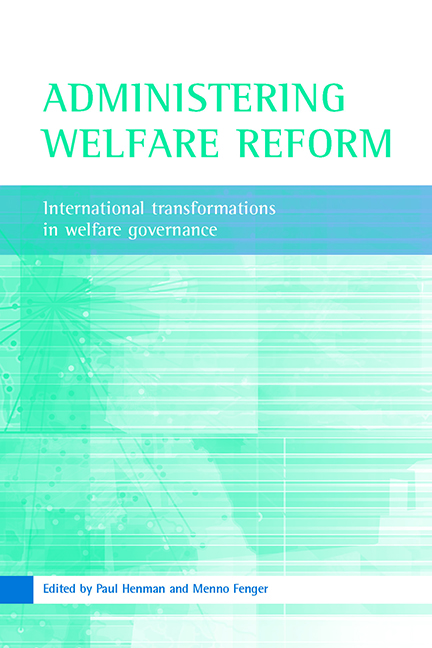Book contents
- Frontmatter
- Contents
- List of tables
- Preface
- Acknowledgements
- List of abbreviations
- Notes on contributors
- one Introduction: administering welfare reform
- two Welfare reform as governance reform: the prospects of a governmentality perspective
- Part One Participants: reforming the agents of welfare delivery
- Part Two Practices: the welfare governance of street-level practices
- Part Three Processes: the changing spaces of welfare governance
- Index
- Also available from The Policy Press
twelve - Reforming welfare governance: reflections
Published online by Cambridge University Press: 14 January 2022
- Frontmatter
- Contents
- List of tables
- Preface
- Acknowledgements
- List of abbreviations
- Notes on contributors
- one Introduction: administering welfare reform
- two Welfare reform as governance reform: the prospects of a governmentality perspective
- Part One Participants: reforming the agents of welfare delivery
- Part Two Practices: the welfare governance of street-level practices
- Part Three Processes: the changing spaces of welfare governance
- Index
- Also available from The Policy Press
Summary
The implementation and ongoing administration of policies is long regarded as a key factor in the success or failure of public policies. Furthermore, many studies (for example, Mashaw, 1983; Lipsky, 1980; Clarke et al, 2000; Clarke and Newman, 1997) have demonstrated that the way in which public policy is administered significantly contributes to the nature and effects of the welfare state, particularly as they pertain to citizen–state relations. It is therefore surprising that in the proliferation of comparative welfare state studies, the practical and implementational side of welfare has received relatively less attention.
The chapters in this book have provided a first, general overview of the contribution a comparative practical approach of welfare reform might offer to contemporary welfare state studies. They show the effects of the implementation of both ‘governance’ and ‘New Public Management’ (NPM) principles, which have highly influenced welfare administration since the 1990s, in reconfiguring the nature and experience of welfare claimants, welfare staff and welfare agencies. By focusing on the changing institutional participants of welfare administration and practices of administering and managing welfare delivery, the authors in this volume have gone beyond the more traditional approach in welfare state research that focuses on welfare reform policies, causes and consequences. In our view, it is these implementational and practical aspects of welfare reform that are necessary to understand the full nature and effects of welfare reform.
In this final chapter, we focus first on the overall lessons that might be learnt from the chapters in this book. Following the structure of the book, we begin by focusing on the changing participants in welfare administration, followed by an analysis of the impact of welfare reform on the street-level practices in welfare agencies and a discussion of the spaces of welfare administration processes as they increasingly move beyond their traditional base of the nation state. This section also focuses on the interrelatedness of the separate elements of our ‘triple P’ framework. Analysing the participants, practices and processes from an integrative perspective makes clear that three different logics of welfare administration might be distinguished. These logics shape the implementation of welfare reform in a way that is comparable to the way in which Esping-Andersen's (1990) welfare regimes shape the development of welfare policies. The second section recalls the governance–governmentality framework that was developed in Chapter Two, and examines the observations from the book's chapters from this perspective.
- Type
- Chapter
- Information
- Administering Welfare ReformInternational Transformations in Welfare Governance, pp. 257 - 278Publisher: Bristol University PressPrint publication year: 2006



